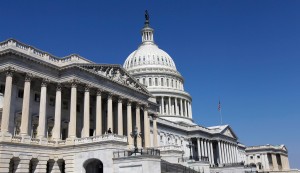Why is Congress Promoting Global Hunger?
 Congress is considering re-imposing requirements that at least three-quarters of all US food aid be transported on American flagged ships. The requirement, which had been reduced to half of all US food aid by the Obama administration last year, is effectively a $75 million subsidy to the US maritime industry. By requiring that American food aid be transported on US-flagged ships, the law would increase the cost of delivering food aid dramatically and slow delivery times, effectively denying food aid to an estimated 2 million recipients around the world.
Congress is considering re-imposing requirements that at least three-quarters of all US food aid be transported on American flagged ships. The requirement, which had been reduced to half of all US food aid by the Obama administration last year, is effectively a $75 million subsidy to the US maritime industry. By requiring that American food aid be transported on US-flagged ships, the law would increase the cost of delivering food aid dramatically and slow delivery times, effectively denying food aid to an estimated 2 million recipients around the world.
Now food aid has lots of problems. In can undermine production in recipient countries, depressing prices for local farmers. Food aid shipped from the United States—regardless of the requirement to ship on US-flagged vessels—is almost always more expensive than purchasing food in the region. And US policy makers have long been clear that the primary purpose of US food aid programming was to protect American farmer and American industry. The US Agency for International Development (USAID) noted that it cost roughly $1,188 per metric ton to purchase and ship food aid from the United States to recipient countries, but only $929 per metric ton to purchase food locally or regionally and distribute it to recipients. The roughly 20 percent savings found through local and regional sourcing—a process known as Local and Regional Purchasing, or LRP—would mean roughly 20 percent more food aid purchased and delivered for the same cost. The requirement that US food aid be shipped on US-flagged vessels represents the most egregious form of hidden subsidies. It increases the cost of delivering food aid, according to some estimates, by as much as 40 percent.
Defenders of the requirement argue that it’s necessary to ensure military readiness; that providing this hidden subsidy to US cargo vessels helps ensure that a fleet of cargo vessels would be available if the United States needed them for war. But the Defense Department has already rejected that claim,noting in a letter to Congress last year that most of the cargo vessels used to ship US food aid are too old, inefficient, and slow to be useful to the military. Studies by both the Department of Homeland Security and the Government Accountability Office support the Department of Defense’s conclusion.
The House of Representatives voted to approve the provision as part of the Coast Guard and Maritime Transportation Act (HR4005). That bill is now being considered by the Senate’s Commerce, Science, and Transportation Committee. So write your Senators and tell them to oppose the “cargo preference” requirement in the Coast Guard and Maritime Transportation Act. Defeating that measure will go a long way to helping ensure 2 million more people are fed.
Reblogged this on Dr. B. A. Usman's Blog.